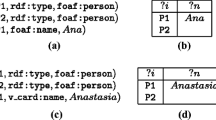Abstract
SPARQL has become the gold-standard for RDF query languages. Nevertheless, we believe there is further room for improving RDF query languages. In this chapter, we investigate the addition of rules and quantifier alternation to SPARQL. That extension, called SPARQLog, extends previous RDF query languages by arbitrary quantifier alternation: blank nodes may occur in the scope of all, some, or none of the universal variables of a rule. In addition, SPARQLog is aware of important RDF features such as the distinction between blank nodes, literals and IRIs or the RDFS vocabulary. The semantics of SPARQLog is closed (every answer is an RDF graph), but lifts RDF’s restrictions on literal and blank node occurrences for intermediary data. We show how to define a sound and complete operational semantics that can be implemented using existing logic programming techniques. While SPARQLog is Turing complete, we identify a decidable (in fact, polynomial time) fragment SwARQLog ensuring polynomial data-complexity inspired from the notion of super-weak acyclicity in data exchange. Furthermore, we prove that SPARQLog with no universal quantifiers in the scope of existential ones (∀ ∃ fragment) is equivalent to full SPARQLog in presence of graph projection. Thus, the convenience of arbitrary quantifier alternation comes, in fact, for free. These results, though here presented in the context of RDF querying, apply similarly also in the more general setting of data exchange.
Preview
Unable to display preview. Download preview PDF.
Similar content being viewed by others
References
Broekstra, J., Kampman, A.: An rdf query and transformation language. In: Semantic Web and Peer-to-Peer, pp. 23–39. Springer, Berlin (2006)
Bry, F., Furche, T., Ley, C., Linse, B., Marnette, B.: Rdflog: It’s like datalog for rdf. In: Proc. Workshop on (Constraint) Logic Programming (WLP) (2008)
Bry, F., Furche, T., Ley, C., Linse, B., Marnette, B.: Taming existence in rdf querying. In: Proc. Int’l. Conf. on Web Reasoning and Rule Systems (RR) (2008)
Deutsch, A., Nash, A., Remmel, J.: The chase revisited. In: Proc. ACM Symp. on Principles of Database Systems (PODS), pp. 149–158. ACM, New York (2008)
Ebbinghaus, H.D., Flum, J., Thomas, W.: Mathematical Logic. Springer, Berlin (1994)
Fagin, R., Kolaitis, P.G., Miller, R.J., Popa, L.: Data exchange: Semantics and query answering. In: Proc. Int’l. Conf. on Database Theory (ICDT), pp. 207–224 (2003)
Fagin, R., Kolaitis, P.G., Popa, L.: Data exchange: Getting to the core. ACM Trans. Database Syst. 30(1), 174–210 (2005)
Fagin, R., Kolaitis, P.G., Popa, L., Tan, W.C.: Composing schema mappings: Second-order dependencies to the rescue. ACM Trans. Database Syst. 30(4), 994–1055 (2005)
Furche, T., Linse, B., Bry, F., Plexousakis, D., Gottlob, G.: RDF querying: language constructs and evaluation methods compared. In: Tutorial Lectures Int’l. Summer School ‘Reasoning Web’. Lecture Notes in Computer Science, vol. 4126, pp. 1–52. Springer, Berlin (2006). 19 citations [Google Scholar]
Gutierrez, C., Hurtado, C., Mendelzon, A.O.: Foundations of Semantic Web databases. In: Proc. ACM Symp. on Principles of Database Systems (PODS), pp. 95–106. ACM, New York (2004)
Hayes, P., McBride, B.: Rdf semantics. Recommendation, W3C (2004)
Karvounarakis, G., Alexaki, S., Christophides, V., Plexousakis, D., Scholl, M.: Rql: a declarative query language for rdf. In: Proc. Int’l. World Wide Web Conf. (WWW), pp. 592–603. ACM, New York (2002)
Marnette, B.: Generalized schema-mappings: From termination to tractability. In: Proc. ACM Symp. on Management of Data (SIGMOD). ACM, New York (2009)
Meier, M., Schmidt, M., Lausen, G.: Stop the chase. CoRR (2009). arXiv:0901.3984
Muñoz, S., Pérez, J., Gutierrez, C.: Minimal deductive systems for rdf. In: Proc. European Semantic Web Conf. (ESWC). Lecture Notes in Computer Science, vol. 4519, pp. 53–67. Springer, Berlin (2007)
Noy, N., Rector, A., Hayes, P., Welty, C.: Defining n-ary relations on the Semantic Web. Working group note, W3C (2006)
Oetsch, J., Tompits, H., Woltran, S.: Facts do not cease to exist because they are ignored: Relativised uniform equivalence with answer-set projection. In: Proc. Nat’l. Conf. on Artificial Intelligence (AAAI), pp. 458–464 (2007)
Polleres, A.: From sparql to rules (and back). In: Proc. Int’l. World Wide Web Conf. (WWW), pp. 787–796. ACM, New York (2007)
Prud’hommeaux, E., Seaborne, A.: SPARQL Query Language for RDF. Proposed Recommendation, W3C (2007)
Rosati, R.: The limits and possibilities of combining description logics and datalog. In: Proc. Int. Conf. on Rule Markup Languages (RuleML), pp. 3–4 (2006)
Schenk, S., Staab, S.: Networked graphs: a declarative mechanism for sparql rules, sparql views and rdf data integration on the web. In: Proc. Int’l. World Wide Web Conf. (WWW), pp. 585–594. ACM, New York (2008)
Schmidt, M., Meier, M., Lausen, G.: Foundations of sparql query optimization. CoRR (2008). arXiv:0812.3788
Sintek, M., Decker, S.: Triple—a query, inference, and transformation language for the Semantic Web. In: Proc. Int’l. Semantic Web Conf. (ISWC) (2002)
ter Horst, H.J.: Completeness, decidability and complexity of entailment for rdf schema and a semantic extension involving the owl vocabulary. In: Web Semantics: Science, Services and Agents on the World Wide Web3 (2005)
Yang, G., Kifer, M.: Reasoning about anonymous resources and meta statements on the Semantic Web. J. Data Semant. 1, 69–97 (2003)
Author information
Authors and Affiliations
Corresponding author
Editor information
Editors and Affiliations
Rights and permissions
Copyright information
© 2010 Springer-Verlag Berlin Heidelberg
About this chapter
Cite this chapter
Bry, F., Furche, T., Marnette, B., Ley, C., Linse, B., Poppe, O. (2010). SPARQLog: SPARQL with Rules and Quantification. In: de Virgilio, R., Giunchiglia, F., Tanca, L. (eds) Semantic Web Information Management. Springer, Berlin, Heidelberg. https://doi.org/10.1007/978-3-642-04329-1_15
Download citation
DOI: https://doi.org/10.1007/978-3-642-04329-1_15
Published:
Publisher Name: Springer, Berlin, Heidelberg
Print ISBN: 978-3-642-04328-4
Online ISBN: 978-3-642-04329-1
eBook Packages: Computer ScienceComputer Science (R0)




